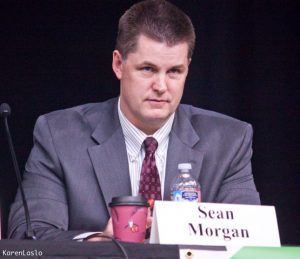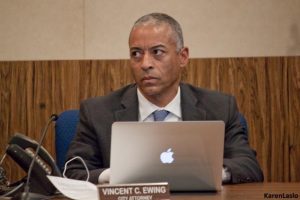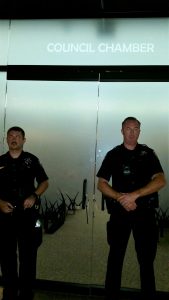ChicoSol Editor Leslie Layton sent a letter Tuesday demanding that Chico city officials “cease and desist” from barring ChicoSol journalists from covering City Council meetings and all other city government business.
Layton alleges in the letter, dated Sept. 11, that city officials violated the Brown Act, California’s open-meeting law, when Chico police officers barred ChicoSol News Director Dave Waddell from entering the Sept. 4 City Council meeting to which all other news media had been admitted. In addition, City Clerk Debbie Presson asked Karen Laslo, a freelance photographer on assignment for ChicoSol, to leave the council chamber, which Laslo did.

Mayor Sean Morgan
Layton’s cease and desist letter was written pursuant to California Government Code section 54960. According to that statue, the city, if it so chooses, can “avoid unnecessary litigation” by admitting in open council session that the Brown Act violation occurred and committing to not repeating such violations.
Jim Ewert, longtime counsel for the California Newspaper Publishers Association (CNPA), to which ChicoSol belongs, said city officials appear to have violated the Brown Act in preventing ChicoSol journalists from covering the meeting. “I don’t think what they did was in compliance,” Ewert said.
Mayor Sean Morgan, asked for his response to ChicoSol’s treatment at the Sept. 4 meeting, said he was sorry ChicoSol was barred and would try to make sure it didn’t happen again. He also hung up the phone at one point during an interview with this reporter.
“I don’t think you were recognized as a legitimate member of the press,” said Morgan, after ChicoSol called him back. “I can’t speak to whether that was correct or not.”
Shortly after the Sept. 4 council meeting, ChicoSol attempted to contact Vince Ewing, whose city of Industry law firm the City Council contracts with for city attorney services. When told the nature of the call, a person who was identified as Ewing’s associate told ChicoSol to call City Manager Mark Orme in order to be “re-directed” back to Ewing.

City Attorney Vince Ewing
The associate provided a telephone number that went into Orme’s voicemail. The message left by ChicoSol asked, among other things, why it was necessary to go through the city manager to communicate with the city attorney.
“I don’t know why, either,” Orme said in a voice message he later left for ChicoSol. Orme’s message noted that the city attorney is an appointee of the City Council over whom he has no authority. Orme encouraged ChicoSol to “put something in writing” describing its exclusion from the Council meeting and to submit it directly to Ewing.
“I don’t want to play middleman unless you need me to,” Orme told ChicoSol.
At the Sept. 4 council meeting, Morgan cleared the chamber of the public after repeated disruptions during a hearing on the city’s so-called Sit and Lie Ordinance. When Waddell tried to re-enter the chamber, he was barred from doing so by two Chico policemen blocking the entrance.

Barring the door
Officer Jeff Durkin, saying he was operating on orders of the mayor, said he would not admit Waddell without a proper press credential. Waddell produced both his driver’s license and his ChicoSol business card, but Durkin declined to look at them.
Laslo, the photographer on assignment for ChicoSol, said she showed Presson some of her photos previously published by ChicoSol, yet was still asked to leave by the city clerk.
Ewert, the CNPA attorney, said state law “doesn’t say anything about credentialing the press or how that’s done,” noting that the California Highway Patrol stopped issuing press passes about 20 years ago. Today, most news media create their own press credentials, he added.
U.S. courts have ruled that First Amendment protections don’t apply only to the “institutional press” or exclusively to the print media, but must be given to outlets that disseminate information to the public regardless of the medium and regardless of whether the producers are trained as professional journalists. (Most of ChicoSol’s content is produced by professionally-trained, experienced journalists.)
If government agencies do provide press credentials, they must be clear about their standards.
“Government agencies are prohibited from deciding arbitrarily whether you are entitled to a press credential, and are required to publish the standards used,” says the Electronic Frontier Foundation, a San Francisco-based nonprofit digital rights organization.
Dave Waddell is news director at ChicoSol.
